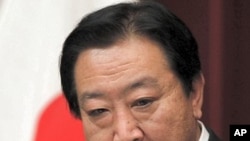An agreement to remove almost half the U.S. Marines from the Japanese island of Okinawa could lead to progress on other issues when Japan's Prime Minister Yoshihiko Noda visits Washington on Monday.
Analysts say the disagreement over the U.S. forces on Okinawa has been an irritant in relations between Washington and Tokyo for years.
The deal, reached Thursday, would move about 9,000 Marines from Okinawa to Australia, the U.S. territory of Guam or the state of Hawaii.
A senior White House official said Friday that the breaking of the stalemate over Okinawa allows both countries' leaders to focus on other security issues.
Japan's U.S. Ambassador, Ichiro Fujisaki, said Thursday at a forum sponsored by the Washington-based Center for Strategic and International Studies that the agreement will improve U.S. protection of its Asia-Pacific allies.
"There will be more distribution of U.S. forces in the Asia-Pacific, which will fortify the U.S. presence, I think, and which will add to the fortification of deterrents in that area, so we welcome that," he said.
When President Obama and Prime Minister Noda meet in the Oval Office on Monday, North Korea and its nuclear ambitions are expected to be near the top of the agenda.
The recent attempted rocket launch by Pyongyang caused concern in nearby Japan and other Asian neighbors.
The U.S. and Japanese leaders may also discuss Tehran's nuclear ambitions. Analyst Sheila Smith at the Washington-based Council on Foreign Relations says Tokyo has also been working to help tighten sanctions on Iran.
"Japan’s energy dependence on Iran has been slowly reduced since the sanctions in 2006," she said. "Forty percent of Japan's oil was imported from Iran. Now I think it is less than 10 percent. So Japan works very closely with us in terms of our U.N. Security Council conversation on Iran as well."
Also likely to come up in Monday's meeting is Japan's role in helping to rebuild and stabilize Afghanistan.
Another priority will probably be the state of the world economy, and Japan's recovery from last year's earthquake, tsunami and nuclear disaster.
Perhaps the ceremonial highlight of the prime minister's visit will be the U.S. gift of 3,000 dogwood trees to be planted in a park in Tokyo.
Assistant Secretary of State Kurt Campbell says the gesture comes on the 100th anniversary of Japan's gift of cherry trees to the United States.
"And we hope that, as a gesture, it will be something that our children and our children's children, both in the United States and Japan, will have the opportunity to enjoy and treasure, just as we have had the opportunity to treasure the cherry trees," said Campbell.
Despite some disagreements, such as the deployment of U.S. Marines in Okinawa, a senior Obama administration official says U.S.-Japan relations are strong.
Defense Secretary Leon Panetta, in a statement Thursday, called Japan "not just an ally, but a close friend."
News
Security Issues Expected to Top Obama-Noda Meeting
- By Kent Klein




